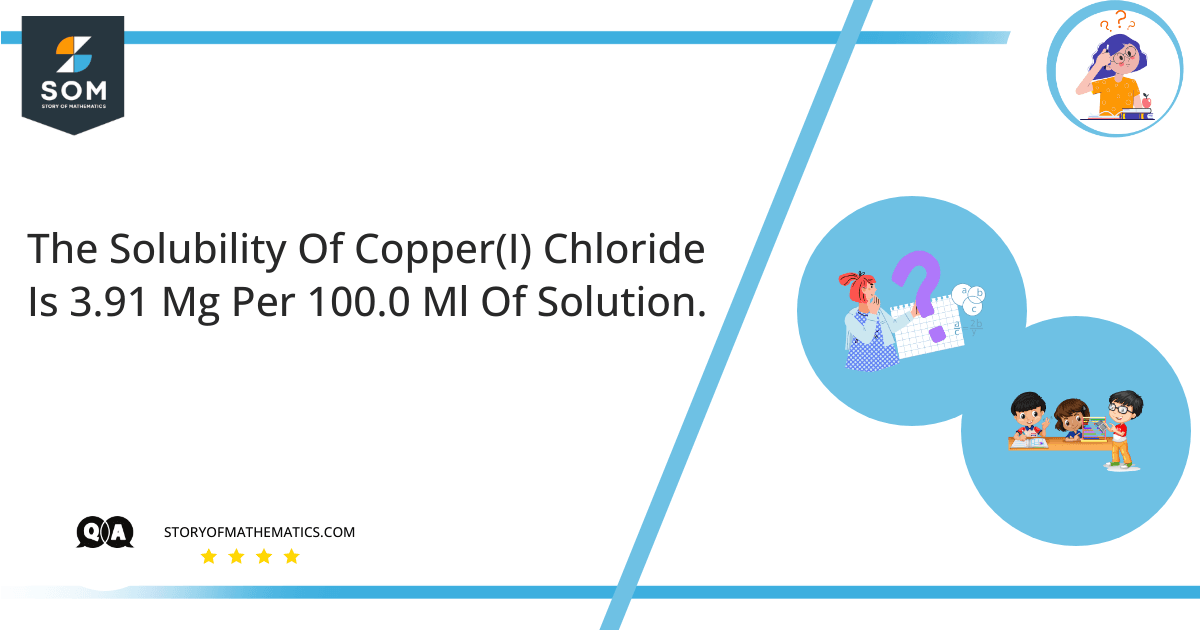
This question aims to find the solubility product $ k_{ sp } $ involved in the solubility reactions and proportions.
This is a four-step process. First, we find the molar mass of the given compound using its chemical formula. Second, we find the mass of of given compound dissolved in 1 L solution. Third, we find the number moles of given compound dissolved in 1 L solution. Fourth, we find the solubility product of the solution.
Given a reaction:
\[ A_{(s)} \longleftrightarrow d \ B_{(a)} \ + \ e \ C_{(a)} \]
Where B and C are the ions formed as a result of dissolving A while d and e are the proportions. The solubility product can be calculated by using the following formula:
\[ K_{ sp } \ = \ [ B ]^d \ \times \ [ C ]^e \]
Expert Answer
Step (1) – Calculating the molar mass of copper chloride $ Cu Cl $:
\[ \text{Molar mass of CuCl } = \ \text{Molar mass of copper } + \text{ Molar mass of chlorine } \]
\[ \Rightarrow \text{Molar mass of CuCl } = \ 63.546 \ + \ 35.453 \]
\[ \Rightarrow \text{Molar mass of CuCl } \ = \ 98.999 \ \approx \ 99 \ g/mole \]
Step (2) – Calculating the mass of of copper chloride $ Cu Cl $ dissolved in 1 L = 1000 mL solution:
\[ \text{ 100 mL of copper chloride } = \ 3.91 \ mg \]
\[ \Rightarrow \text{ 1 mL of copper chloride } = \ \dfrac{ 3.91 }{ 100 } \ mg \]
\[ \Rightarrow \text{ 1000 mL of copper chloride } = \ 1000 \times \dfrac{ 3.91 }{ 100 } \ mg \ = \ 39.1 \ mg \]
\[ \Rightarrow \text{ 1000 mL of copper chloride } \ = \ 39.1 \ mg \ = \ 0.0391 \ g \]
Step (3) – Calculating the number moles of copper chloride $ Cu Cl $ dissolved in 1 L = 1000 mL solution:
\[ \text{ Number of Moles in 1000 mL solution } = \ \dfrac{ \text{ Mass in 1000 mL solution } }{ \text{ Molar Mass } } \]
\[ \Rightarrow \text{ Number of Moles in 1000 mL solution } = \ \dfrac{ 0.0391 }{ 99 \ g/mole } \]
\[ \Rightarrow \text{ Number of Moles in 1000 mL solution } = \ 0.000395 \ mole \]
Step (4) – Calculating the solubility product constant $ K_{ sp } $.
The solubility reaction can be written as:
\[ CuCl \longleftrightarrow Cu^+ \ + \ Cl^- \]
This means that:
\[ [ CuCl ] \ = \ [ Cu^+ ] \ = \ [ Cl^- ] \ = \ 0.000395 \ mole \]
So:
\[ K_{ sp } \ = \ [ Cu^+ ]^1 \ \times \ [ Cl^- ]^1 \]
\[ \Rightarrow K_{ sp } \ = \ 0.000395 \ \times \ 0.000395 \]
\[ \Rightarrow K_{ sp } \ = \ 1.56 \times 10^{ -7 } \]
Numerical Result
\[ K_{ sp } \ = \ 1.56 \times 10^{ -7 } \]
Example
For the same scenario, given the above values, calculate the $ K_{ sp } $ if 100 g is dissolved in a 1000 mL solution.
Step (1) – We already have the molar mass of copper chloride $ Cu Cl $.
Step (2) – The mass of of copper chloride $ Cu Cl $ dissolved in 1 L = 1000 mL solution is given.
Step (3) – Calculating the number of moles of copper chloride $ Cu Cl $ dissolved in 1 L = 1000 mL solution:
\[ \text{ Number of Moles in 1000 mL solution } = \ \dfrac{ \text{ Mass in 1000 mL solution } }{ \text{ Molar Mass } } \]
\[ \Rightarrow \text{ Number of Moles in 1000 mL solution } = \ \dfrac{ 100 \ g }{ 99 \ g/mole } \]
\[ \Rightarrow \text{ Number of Moles in 1000 mL solution } = \ 1.01 \ mole \]
Step (4) – Calculating the solubility product constant $ K_{ sp } $:
\[ [ CuCl ] \ = \ [ Cu^+ ] \ = \ [ Cl^- ] \ = \ 1.01 \ mole \]
So:
\[ K_{ sp } \ = \ [ Cu^+ ]^1 \ \times\ [ Cl^- ]^1 \ = \ 1.01 \ \times\ 1.01 \ = \ 1.0201 \]
